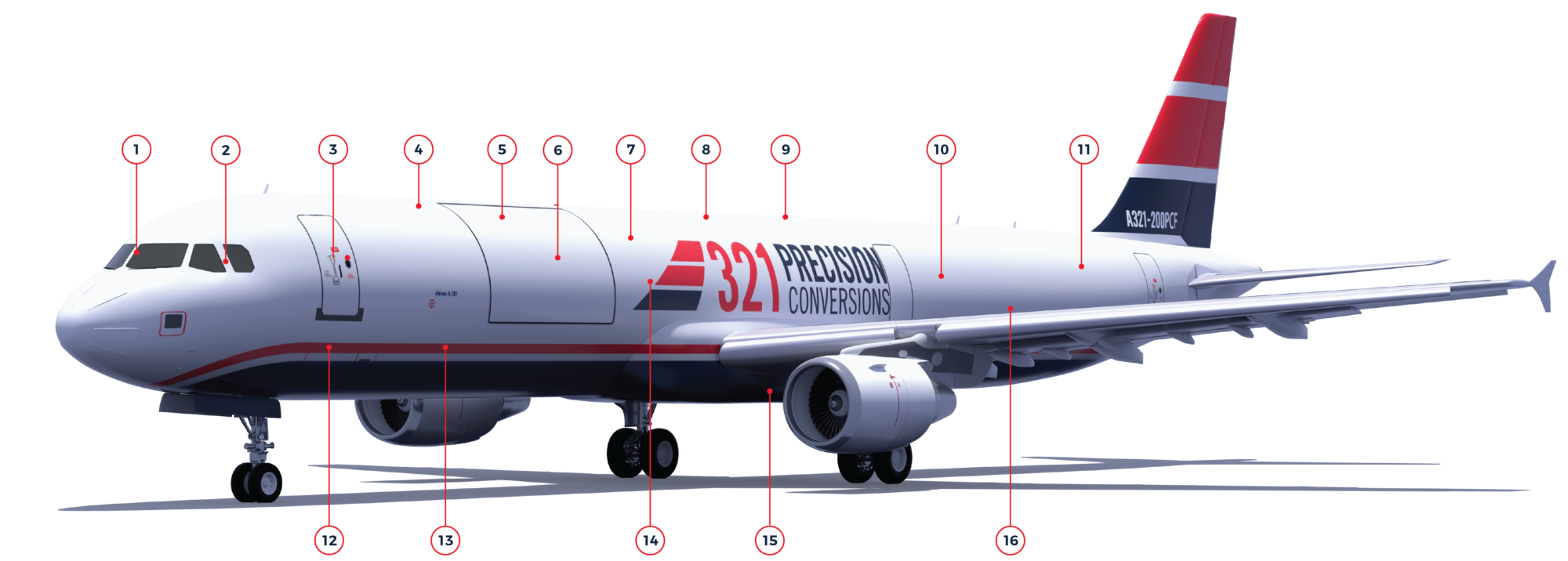
Air Transport Services Group (ATSG) has lined up operators for its first two Airbus A321 converted freighters and expects to receive its FAA supplemental type certificate (STC) for the program around July 1, the company’s top executive said.
“We’re still targeting having the STC approved, call it midyear of this year,” ATSG president Joe Hete said on a Mar. 3 earnings call. “The prototype aircraft already has an end-user customer as well as the second aircraft, which will be inducted shortly to begin its modification process.”
ATSG did not name the A321F operators and did not immediately respond to an inquiry.
The conversions are being done by 321 Precision Conversions, a joint venture between Precisions Conversion and ATSG subsidiary Cargo Aircraft Management (CAM) formed in 2017. The original time frame saw STC approval in 2019, and the first aircraft entering service this year.
The slippage could end up benefiting the venture, however. A combination of the Boeing 737 MAX’s return to service and the still-emerging COVID-19 air traffic decline could combine to create a surge of excess capacity later this year, which could drive prices of older narrowbodies down. The MAX’s March 2019 grounding following two fatal accidents in five months has removed about 800 aircraft from the fleet—387 in service and another 400 built by Boeing but not handed over to customers. This has left operators scrambling to fill gaps in their networks, disrupting fleet plans.
“The 737 MAX is still having an impact on the way airlines view their fleet—what they’re going to be leasing and what they need to hang on to,” Hete said. “So at this point in time, we haven’t seen any impact as it relates to feedstock availability.”
Boeing expects regulators to clear the MAX to fly again this year, which would lead to airlines working them back into their fleets in significant numbers during the fourth quarter. If the COVID-19 crisis creates strong enough headwinds, the resulting schedule reductions combined with the MAX’s return may free up some older aircraft for re-purposing as freighters. ATSG calculates that the global A321 passenger fleet includes about 240 aircraft that are between 16-20 years old, making them prime targets for conversion feedstock—at the right price.
The joint venture’s (JV) timing also bodes well for its strategy of targeting Boeing 757 freighter operators as possible A321F customers. The global fleet has more than 300 757Fs, including 185 with FedEx and UPS. The fleet’s average age is 27.3 years, and operators are eyeing replacements. ATSG confirmed that DHL is not renewing wet leases on four 757Fs—each age 29 or older—it has in the express carrier’s network.
“It’s not an efficient aircraft,” Hete said about the 757F. “It works okay in express environment if you’ve only got enough freight to fly the lanes that it flies, but it really is a higher-cost aircraft. And that’s why you haven’t seen us grow the airframe.”
ATSG’s fleet of 98 aircraft as of Dec. 31, 2019 included four 757Fs and four combis that support U.S. military contracts. The fleet’s backbone is the 767. It operates 42 767-300Fs and has eight more in the conversion pipeline, and also has 33 767-200Fs.
“We’ve always tried to push our customers towards the 767-200 rather than the 757,” Hete added. “I think DHL has looked at the 757 and looked at the alternatives that they have, and they recognize as much as anybody there are other opportunities to right size your network and be more efficient.”
ATSG calculates that its A321F will reduce fuel burn 19% compared to the 757F while offering 95% of the cubic capacity.
Hete said an unidentified operator is interested in taking two of the ex-DHL 757s. Another option is leasing out the aircraft’s Pratt & Whitney PW2037 engines, which “are very much in demand right now,” he added.
The CAM-Precision venture has competition in the A321 conversion market. An Airbus, ST Aerospace and EFW JV received EASA approval in February for its own A321 STC freighter conversion. Luxembourg-based launch customer Vallair in slated to put the prototype into service in July.





